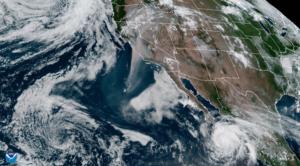CREST participated in a two-day workshop titled Acknowledging the Effects of Climate Change- Let’s Take Action Now organized by the Bureau for Emergency Management and Disaster Administration and Caribbean Climate Adaptation Adaption Network (CCAN)- National Oceanic and Atmospheric Administration (NOAA) Climate Adaptation Partnerships (CAP) Team. CAP is the new name for the NOAA-Climate Program Office that was formerly known as RISA. This workshop was held in the University of Puerto Rico Campus on January 25 and January 26, 2024. Dr. Reza Khanbilvardi, CUNY CREST Executive Director and Mr. Said A Mejia Manrique, CUNY CREST Doctoral student in Civil Engineering at the City College of New York participated in the workshop.
The goal of the workshop was to help attendees understand the effects of climate change and extreme weather events in Puerto Rico, learn about the issues in climate adaptation planning, and gain insights on the continued efforts of the current climate change studies and the mitigation/adaptation and resistance of the hazards caused by climate change over Puerto Rico and the U.S. Virgin Islands. The Puerto Rico authorities also elaborated on the resources they have been employing to combat these impacts. This information was disseminated through informative presentations, panel discussions on the following topics:
- Share the information on the Caribbean Climate chapter highlighted in the 5th U.S National Climate Assessment report with the community
- Puerto Rico’s Climate Change Mitigation, Adaptation, and Resilience Plan
- Federal Emergency Management Agency (FEMA) Guidelines during hazards
- Impact of climate change on cancer prevention and control
- Community Adaptation and Resilience Plans
- Integration of Meteorological and Climatological Research into the NOAA National Weather Service
- Reassessing mitigation plans and the importance of their integration in a holistic approach
The first day of the workshop included working sessions on Science to Action: Integrating Climate Science Into Governance Systems. During these, community members participated in activities that prompted them to share their experiences dealing with climate change impacts. They expressed the lack of help they receive from the government, especially for communities located in remote areas impacted by extreme weather events such as the Hurricane Irma, Maria, and Fiona. The community also spent time answering questions related to the sources of their information related to such events and the ways they relay such information in areas including:
- Education
- Development of plans and reports
- Request for funds and development of proposals
- Project implementation development
- Interagency coordination for preparedness and response
Commenting on his experience of the session, Said said, “It was surprising to learn that some of the community leaders don’t have access to information in the areas discussed during the session because either they are located in remote areas or they weren’t aware that they could access such information.”
The second day of the workshop focused on the Assessment of Tools to Promote Informed Decision-Making on Natural Hazard Risks in Puerto Rico. During this day, the community was informed about the decision-making on natural hazard risks in Puerto Rico. Dr. Patricia Chardon and Stephen Hughes presented all the websites and applications that the community can use to see real-time data and prediction in waves, tidal, and winds as well as the landslide vulnerability maps for the entire Island at a 5-meter resolution. Further, during this session, the attending community gave the presenters suggestions on how they may present the data and thus help the information disseminate better.
The workshop was engaging, informative, and productive. Commenting on his experience, Dr. Khanbilvardi said, “This was an excellent learning opportunity by all in bringing together climate change scientists with Emergency Management agencies, local stakeholders, practitioners, and community leaders in Puerto Rico.”


